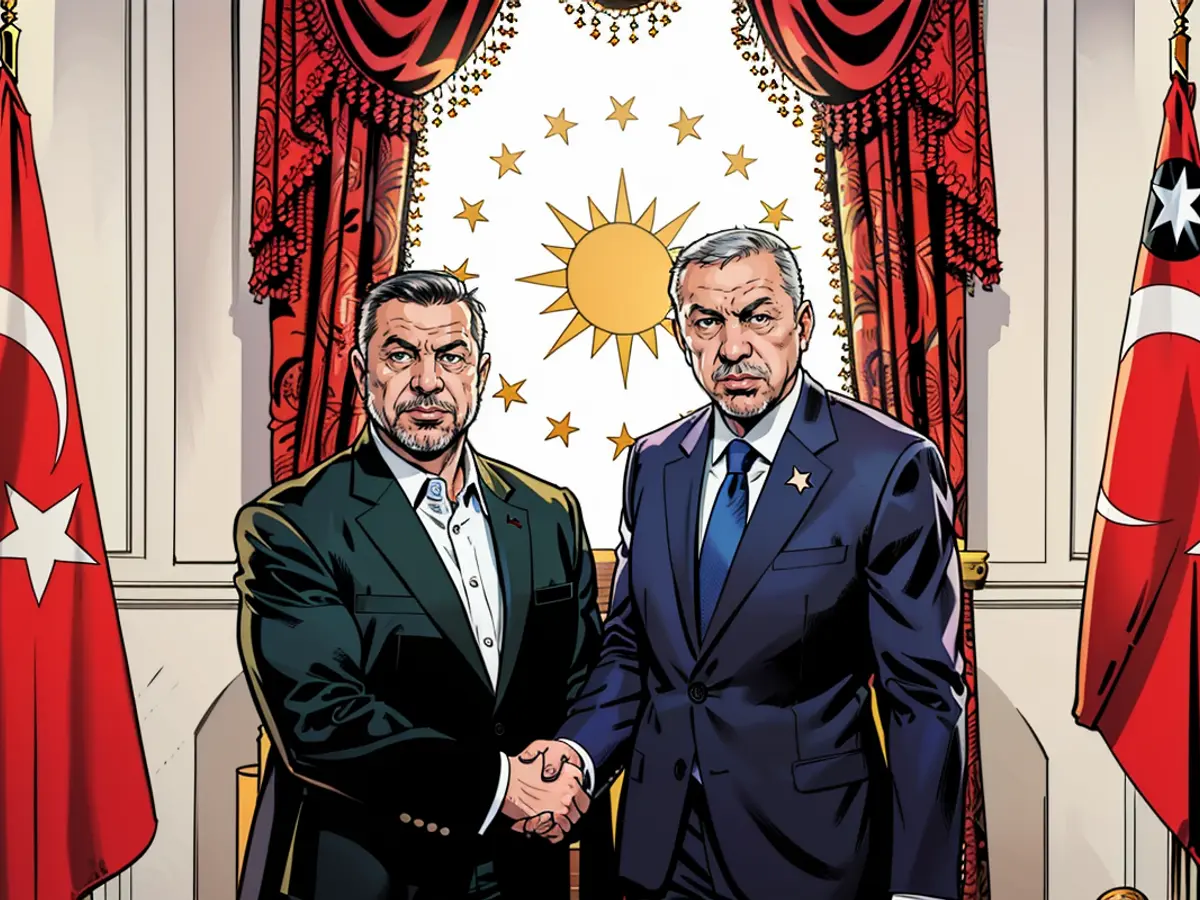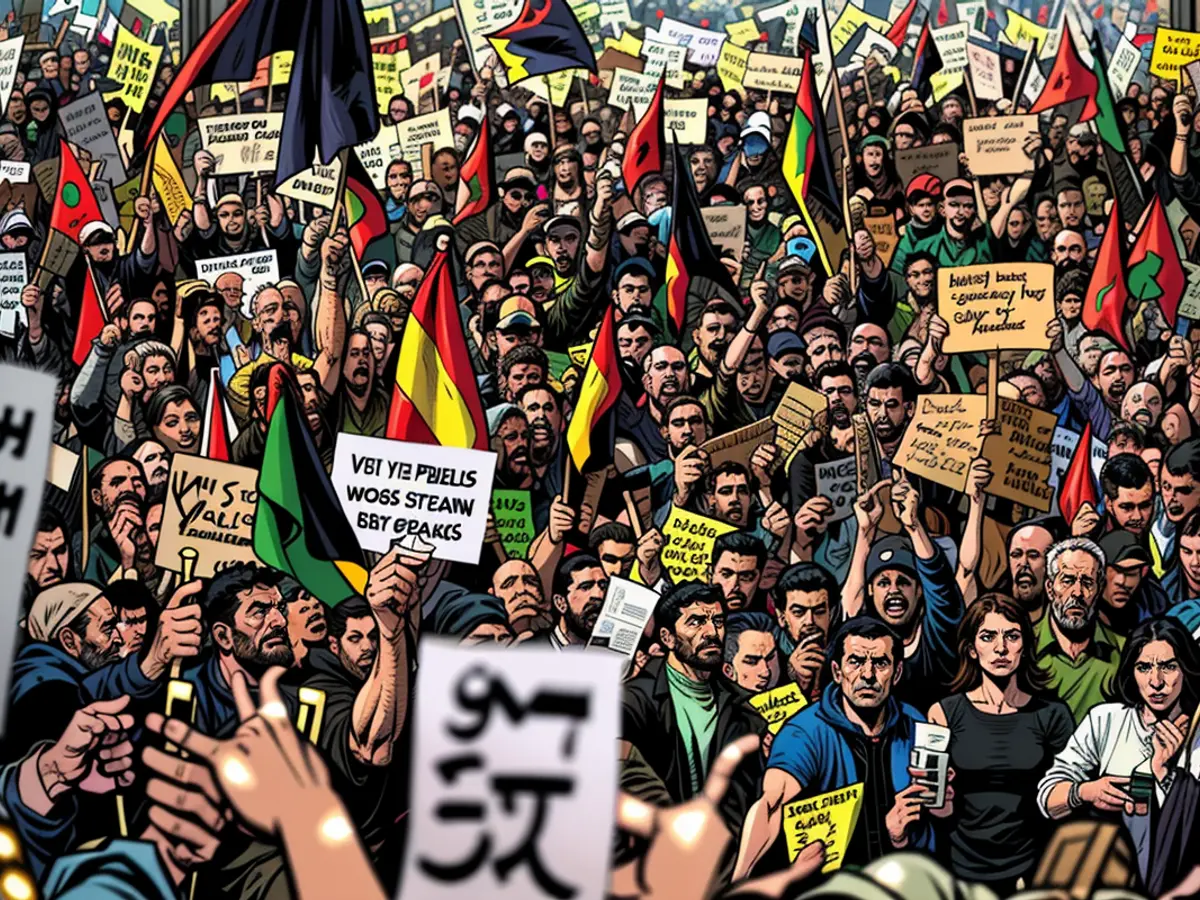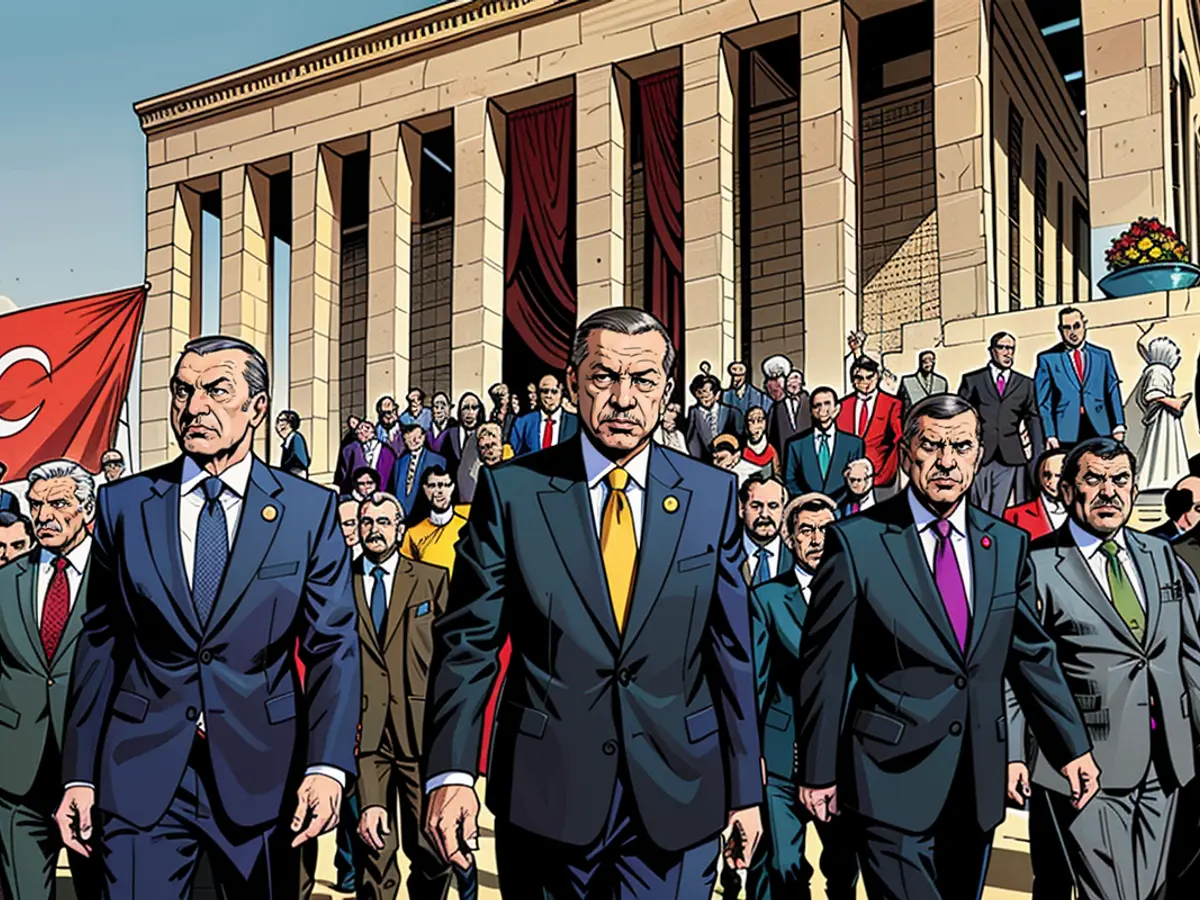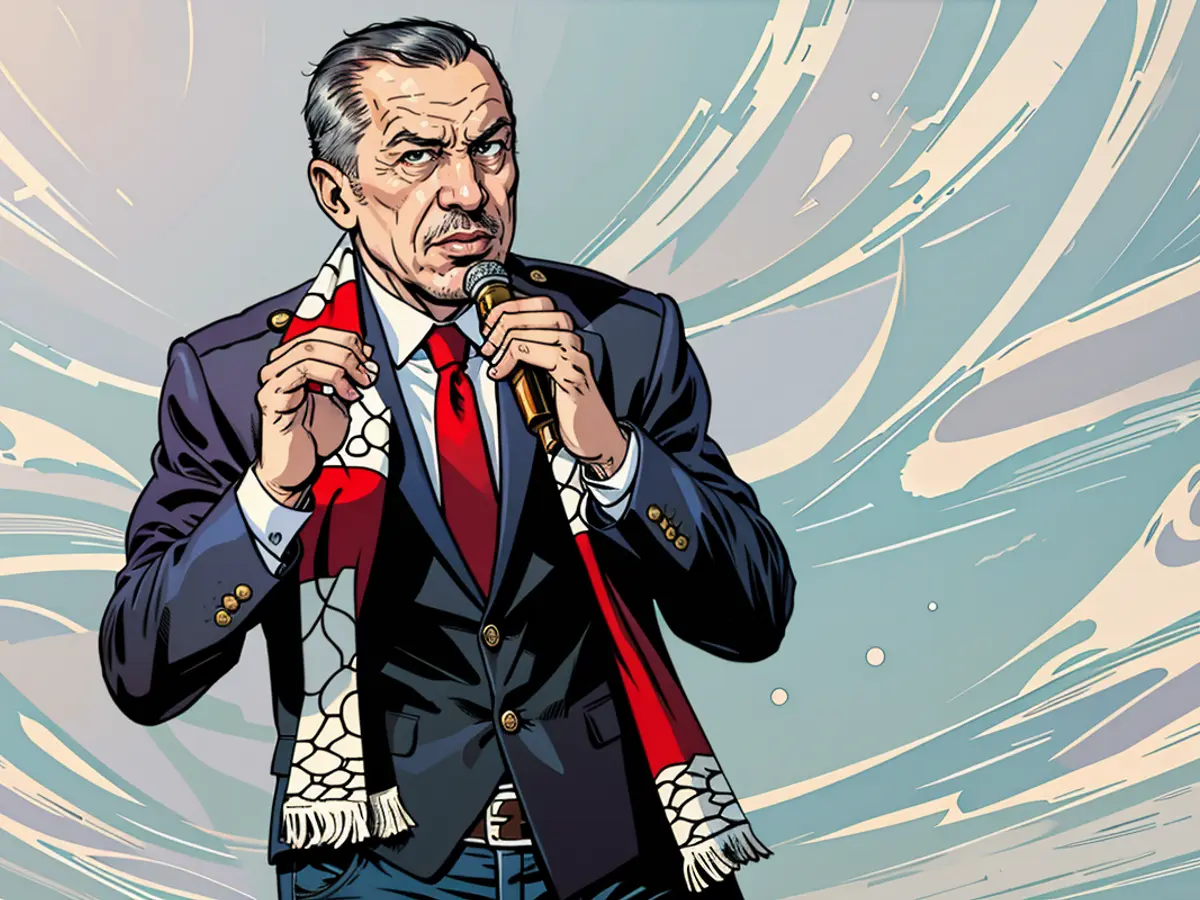Erdogan increases pressure on Israel as his party's support decreases.
The militant Palestinian group is seen as a terrorist organization by most members of NATO, but Turkey disagrees.
Some critics accuse Turkey's President Recep Tayyip Erdogan of taking things too far by supporting Hamas. However, recent events suggest he hasn't completely satisfied his domestic political base yet.
Erdogan's ruling party suffered a major setback when they lost badly in local elections in March. The election loss was partly blamed on his stance on Israel and the Gaza war.
Other political parties, like the smaller and more conservative New Welfare Party, gained support by taking a tougher stance against Israel and demanding concrete actions beyond just words. Their leader, Fatih Erbakan, complained in March that "we do not see (the government) doing anything other than speaking and condemning. There are no sanctions, no concrete steps taken, trade with Israel still continues."
Political scientist Seda Demiralp of Isik University told CNN that Erdogan underestimated the potential of the New Welfare Party and their ability to rally conservative voters.
Changing directions
After the election, Erdogan didn't waste any time trying to win back votes. He quickly started taking action to match his strong words against Israel. Trade with Israel was curtailed, and in just three weeks, all trade was stopped. This suspended around $7 billion worth of trade - mostly Turkish exports - until the war ends.
Last month, Turkey announced plans to join the genocide case against Israel at the International Court of Justice. Their already warm relations with Hamas were further strengthened when Erdogan invited the group's political leader, Ismail Haniyeh, to Istanbul on April 20 and was photographed with him.
Erdogan compared Hamas to the "Kuvayi Milliye," the nationalist militias that fought against foreign occupation during the Turkish War of Independence after World War I.
"Believe me, if it were 100 years ago, they would also call Kuvayi Milliye a terrorist organization, a rebel, a joke, a traitor," Erdogan said to his party's legislators in May, according to Turkish state broadcaster TRT. "This nation has always stood by the oppressed."
The contrast between Turkey's and NATO allies' views on Hamas was clearly evident when Erdogan hosted Greek Prime Minister Kyriakos Mitsotakis last month in Ankara.
"I don't see Hamas as a terrorist organization," Erdogan declared. "On the contrary, Hamas is an organization of resistance, whose territories have been occupied since 1947 and which has been defending its territories after the occupation... If you call them a 'terrorist organization,' it will upset us."
"We can agree to disagree on this topic," Mitsotakis replied.
Erdogan then said that "over 1,000 Hamas members are now under treatment in our hospitals in Turkey."

A Turkish official later clarified that Erdogan actually meant 1,000 Gazans are being treated in Turkish hospitals, not all of them being Hamas members.
Since the war started, the Turkish Ministry of Health has made several airlifts of wounded Gazans and their family members to hospitals in Turkey.
A domestic message
Experts believe Erdogan's comment about Hamas in front of the Greek Prime Minister was more for his domestic audience.
"Western leaders right now are very aware that Erdogan is basically talking for his domestic audience and for the Muslim neighborhood," said Evren Balta, an international relations professor at Ozyegin University in Istanbul.
At home, she explained, Erdogan has successfully linked Hamas with the Palestinian cause. This means that criticizing Hamas can seem like criticizing the Palestinian cause. The strong feeling of empathy toward Palestinians by the Turkish public has made it difficult for politicians to criticize Hamas.
"For Erdogan, Hamas is Palestine. For the opposition, Hamas is not Palestine, but they're having difficulties framing the political discourse," Balta said.
During a political rally before the March local elections, Ozgur Ozel, leader of the secular CHP party founded by Mustafa Kemal Ataturk, the creator of modern Turkey, highlighted his party's long-standing support for the Palestinian cause and denied labeling Hamas as a terrorist organization.
Ozel said, "I have not called Hamas a terrorist organization, but I have condemned its terrorist attacks. I also condemned Israel's state terrorism."
He then challenged Erdogan to stop the trade that his relatives, children, supporters, and friends conduct with Israel every day.
In the aftermath of the elections, Istanbul's CHP mayor Ekrem Imamoglu, a potential future presidential candidate, took heavy criticism from political rivals and in the Turkish press for calling Hamas a terrorist organization in an interview with CNN last month. This was despite his strong condemnation of Israel's "brutal oppression" of Palestinians.
Western allies of Turkey have swiftly criticized Hamas, but they've mostly remained quiet about Ankara's close connection with the group.
Fabrice Pothier, a previous NATO policy chief who presently leads the Rasmussen Global political consultancy, commented, "I believe there's a certain uneasiness about the relationship. It's not harmless when one significant ally is futher off from the others, although NATO can, to an extent, separate overall NATO positions from the individual positions of allies."

In October, NATO head Jens Stoltenberg stated to the German News Agency (DPA) that Turkey's relationship with Hamas didn't pose a problem as "in some ways, it has no influence on what we do or don't do because NATO does not play a role in this particular conflict."
Turkey allows Hamas members to travel to and from the country without hindrance, and their presence in the nation is regular. In December, Erdogan's top foreign policy and security advisor, Akif Cagatay Kilic, disclosed to CNN that Hamas's political leader Haniyeh "may have been" in Turkey on October 7, which coincided with the attack on Israel that resulted in the deaths of 1,200 individuals and the abduction of 250 hostages. However, he maintained that historically, Turkey's relationship with Hamas hasn't just been tolerated by Israel, but even encouraged.
He asserted, "Previous Turkish leaders have been requested – even by (Israeli Prime Minister Benjamin) Netanyahu – to engage with Hamas." Turkey's aim is to establish peace in the region, he added, "We're doing whatever it takes to accomplish that."
'Inflation of mediators'
Although Turkey is not recognized as an official mediator in the Gaza conflict, evidence suggests that it is actively involved in some capacity. In April, Foreign Minister Hakan Fidan stated that Hamas would dismantle its military wing if a Palestinian nation was established within the 1967 borders. This was later confirmed by a Hamas member based in Istanbul, marking the first time the group has agreed to disarm.
Fidan also assisted in relaying messages between Washington and Tehran before Iran's bombardment of Israel in April, and it's possible that Ankara is serving as a go-between for Washington and Hamas.
A Turkish official told CNN, "We've been in touch with both the US and Hamas. We've been advising and pressing both sides for an immediate and permanent ceasefire," referring to calls between Haniyeh and U.S. Secretary of State Antony Blinken that took place on the same day in mid-May.
With Qatar potentially withdrawing from its mediation duties, Balta suggests that Turkey might replace that role, despite its ties to Hamas increasing doubts among Israel and the West. Still, she adds, the West would rather work with Turkey than, say, Iran.
"Western countries can deal with Turkey... so when it comes to Middle Eastern conflicts, who else can be a trustworthy partner? There really aren't any other dependable partners," she stated.
At the moment, Turkey has no interest in formally attempting to end the war in Gaza. "We don't want to create an overabundance of mediators," a Turkish Foreign Ministry official told CNN in April.
Despite some apprehension about Turkey's close ties with Hamas, Western nations, according to Pothier, conclude it's more useful to merely endure it.
"I think the West sees it as beneficial to have countries that can act as an intermediary between us and Hamas," he stated.

Read also:
In the global context, Turkey's stance on Hamas, which is labeled as a terrorist organization by many NATO members, contrasts with the viewpoint of its president, Recep Tayyip Erdogan.
Ergdogan's recent actions, such as curtailing trade with Israel and announcing plans to join the genocide case against Israel at the International Court of Justice, have implications beyond just the Middle East, as Turkey aligns itself more closely with Hamas.







